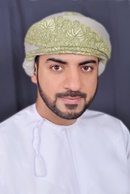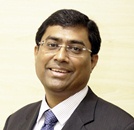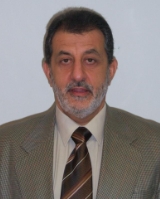| Dhofar University, Institutional Standards Reassessment I, Apr 2018 |
|
| |

|
| Dr Ibrahim Al Harthy |
| |
Dr Ibrahim Al-Harthy is an Assistant Professor in Psychology Department in the College of Education at Sultan Qaboos University (SQU) and earned his Master’s and Doctorate degree, Major in Educational Psychology at Kent State University. Currently, he served as the Director of Academic Accreditation and Quality Assurance Unit (AAQAU) and the Deputy Chair of the Accreditation Steering Committee (ASC) of the college between 2013-2016. Dr Al-Harthy has published several research papers in local, regional and international refereed academic journals and has participated in several international conferences around the globe. His research interests focus on memory, metacognition, and motivation. He has reviewed research proposals, conducted several workshops, lectures and presentations inside and outside the university. Dr Al-Harthy is also a member of an international editorial board, different professional organizations and committees inside and outside the university as well. |
| |
|
|

|
| Dr. Kiran Gopakumar Rajalekshmi |
| |
Dr. Kiran G.R. holds a PhD in Information Systems from the London School of Economics & Political Science, UK. He did his MPhil in Applied Economics from Jawaharlal Nehru University (JNU), New Delhi and his B.Tech in Electronics and Communication Engineering, from College of Engineering, Trivandrum (CET), University of Kerala. He brings around 25 years of vast experience from his key roles at national and international levels in areas relating to higher education management, teaching, research, strategic policy development, quality assurance, social computing, governance reforms, e-governance, and ICT for development. He is currently the Dean of Middle East College (MEC), which is one of the largest Higher Education Institutions in the Sultanate of Oman. Dr. Kiran has been part of the governance bodies of MEC and has been a key member in the development of two five-year strategic plans. In the last 14 years, he has taken the lead in driving the strategic objectives of the college and spearheading institutional efforts on driving student employability and internationalisation. He was instrumental in developing the Quality Management System (QMS) of Middle East College that cuts across all academic and administrative operations of the college. Under his leadership, the QMS has been audited and certified as being in adherence to ISO 9001:2015. He is an External Reviewer with the Oman Authority of Academic Accreditation (OAAA) and with the Bahrain’s Education & Training Quality Authority (BQA). Dr. Kiran was responsible to lead the college in its Institutional Standards Assessment by the OAAA in the year 2019. MEC is now OAAA accredited. |
| |
|
|

|
| Prof. Marios Katsioloudes |
| |
Professor Katsioloudes holds a PhD in Management from the Wharton School of the University of Pennsylvania in Strategy and International Business. He is currently a professor of Management at Qatar University, where he teaches strategic management, international business and entrepreneurship courses at the undergraduate and MBA levels. Throughout his 34-year career, Professor Katsioloudes has taught in a number of universities, including Coastal Carolina University, West Chester University of Pennsylvania, Saint Josephs’ University, Villanova University, USA; the American University of Sharjah, UAE, Abu Dhabi University, UAE, and the Hellenic American University in Greece. He is a visiting professor to the University of Cyprus, Galen University in Belize, Linkoping University in Sweden, EDHEC Business School in France, Tulane University in the USA, HEC-Paris in Qatar, and The Mediterranean Agronomic Institute of Chania, Greece. He has worked for the Cyprus Development Bank and the World Bank. He provided consulting services to SMEs in Cyprus, the US, Libya, Greece, the UAE, Qatar, and elsewhere. His research focuses on the strategic planning process in the for-profit and nonprofit sectors, SMEs, entrepreneurship, as well as on the management of change and innovation. He has authored/co-authored five books, and recently he has signed a contract with Routledge for a second edition for his strategic management book. He published over 34 articles (including three cases studies) and 72 conference proceedings on strategic management, international business and small business management. He has been a reviewer for Universities in Saudi Arabia and Bahrain. |
| |
|
|

|
| Dr. Patsy Paxton |
| |
Dr Patsy Paxton, a Higher Education Consultant based in New Zealand, has a PhD in Education, and her academic quality expertise includes over 20 years’ experience with academic quality issues in the New Zealand and South African tertiary education sectors. She is the former Director of the South Pacific College of Natural Medicine in Auckland, New Zealand (2011-2019). From 2007 – 2011 she served as the Senior Researcher on the South African Norway Tertiary Education Development (SANTED) project, based at the Nelson Mandela University (NMU) in South Africa. Here she was responsible for facilitating the development of coherent approaches to curriculum consolidation as well as appropriate articulation pathways between various programmes. Amongst her many responsibilities as the Academic Director at the Auckland University of Technology (1999-2007), she managed the planning and preparation for the University’s NZUAAU comprehensive academic audit in 2001 and 2006. From 1995 – 1999 Patsy was the Academic Manager at the Waikato Institute of Technology. Before emigrating to New Zealand in 1995, she was a full professor in the Vista University (South Africa) Faculty of Education (1986-1995). Her early years (1974-1986) were spent as a senior teacher of the Economic Sciences (Economics, Business Studies, Commerce). She is committed to academic quality audit and quality assurance principles in higher education and has had extensive experience in conducting academic quality reviews and audits. From her own practical experience, Patsy has a deep understanding of the challenges that often arise when quality management theory and policies are applied to institutions’ daily operations. |
| |
|
|
|